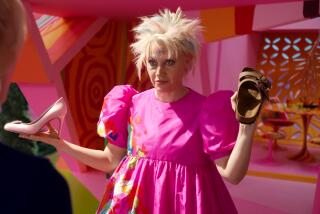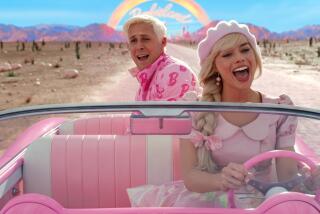In Spite of Wasted Life, Popsi Proves to Be a Real Doll
- Share via
NEWPORT BEACH — Some dolls have everything--the cars, the clothes, the wedding dresses shaped like lilies. If brought to life, they would be cheerleaders and prom queens.
At the other end of the scale, there’s Popsi, a trashy babe if ever there was one. Literally born in a dump, Popsi’s soft, rag-doll body belies her plastic origins--10 two-liter Sprite, Shasta and other soda bottles that are recycled to make each doll.
Popsi comes with a children’s storybook called “Secrets of the Dump” and is packaged in clear soda bottles. “Popsi teaches children that everything in life can be used--nothing and nobody deserves to be thrown away like they’re worthless,” said doll creator Geraldine McMains, 45, of Newport Beach.
Popsi is gaining popularity with the environmentally aware set. About 25 school districts and recycling programs across the country have bought the doll from McMains’ company, Post-Consumer Products. Popsi has been written about by the Environmental Media Assn. and Environmental Magazine and mentioned in Newsweek.
Soon, she may be poised for stardom.
Monday, Popsi and her agent, Richard Ellman of Los Angeles, left for Cannes, France, for a video and television festival. Producers from around the world will consider whether Popsi’s humble origins and happy message might make a good cartoon.
On Friday, Ellman bubbled with the possibilities, speaking in promotional sound bites about his client.
“Popsi just causes all kinds of excitement wherever she is because people look at her and say no way can this thing that’s inside this pop bottle, come from soda pop bottles,” he said.
“Her real value is the message that she has to say about keeping the environment safe and clean, but she does it without boring kids to death.”
Sally Pecora, education specialist for the Lorraine County Solid Waste Authority in Ohio, bought Popsi for precisely that reason.
Pecora visits 130 elementary schools every year, and rather than droning on about saving energy, she tries to giving kids hands-on props to sell them on recycling.
“Second- and third-graders need to see what you’re talking about,” Pecora said. “When I saw this, I thought it would be the perfect thing.”
Popsi, however, is not just a doll, she’s an educational package. The Popsi program for schools includes samples of plastic flakes made from cut up soda bottles, polyester fibers, charts, diagrams, coloring books, an activity list and a sing-along cassette. Yes, there is a Popsi theme song.
Kids learn how Popsis are made from bottles that are chopped into little flakes, which are melted to goo, then are transformed into polyester fabric.
McMains was fascinated by dolls long before starting her company. She longed for a doll while growing up in Bellflower, but her parents said no, punishing her for doing poorly in school.
“Later we found out I was dyslexic, but my parents thought I was a bad girl so my brothers and sisters would get dolls and bikes and presents at Christmas, and I got nothing,” she said. “One Christmas I got a shoe box full of potato peelings.”
The shoe-box Christmas is memorialized in a photo she keeps in her office. A solemn, blond child stares at the camera while her siblings joyously unwrap their presents.
Before starting Post-Consumer Products, McMains owned an art gallery and an advertising agency. Four years ago, her daughter Rachel, then 15, persuaded her to become an environmental entrepreneur.
Today the company sells water sippers made from milk jugs to Fox Studios, note pads from recycled money to Warner Bros. Studios, and hats and T-shirts from plastic soda bottles to Los Angeles and the LAPD. It sells mugs from broken windows and pencils from recycled blue jeans.
The prototype Popsi was completed around Christmas 1996.
When talking about the doll, McMains strikes a balance between emphasizing Popsi’s environmentally positive aspects and her merits as a toy.
“I started this company four years ago, and one thing I’ve found is that no matter what it is you’re selling, just because it’s made from recycled materials doesn’t mean it’s going to have an advantage,” McMains said.
“At first I thought everybody would want to recycle, but the truth is, a product has to be the right price and the right color.”
The doll currently can only be ordered through Post-Consumer Products, and as one environmental writer quipped, Popsi may be trashy but she’s not cheap. The dolls sell for $29 each.
More to Read
Sign up for Essential California
The most important California stories and recommendations in your inbox every morning.
You may occasionally receive promotional content from the Los Angeles Times.













